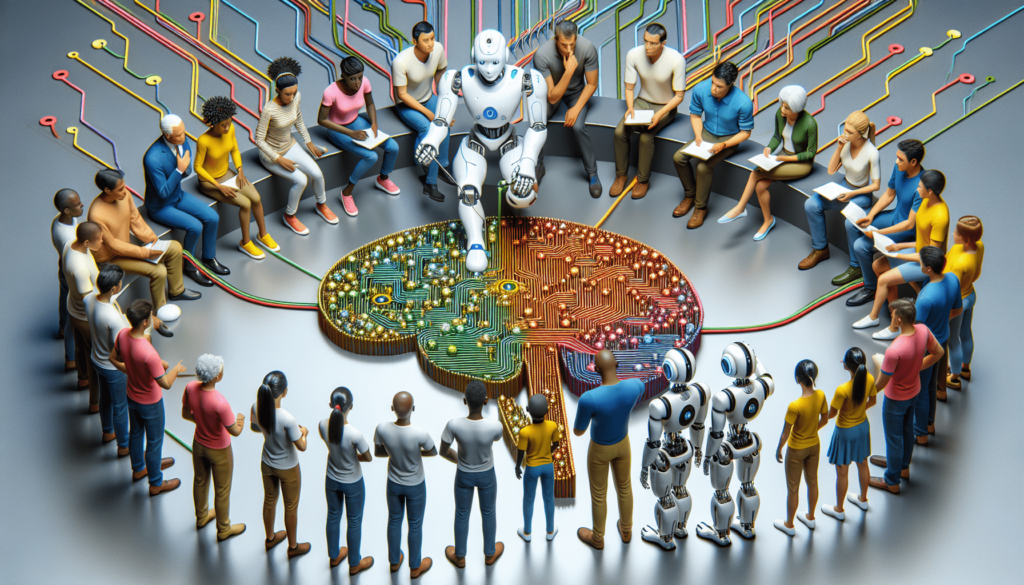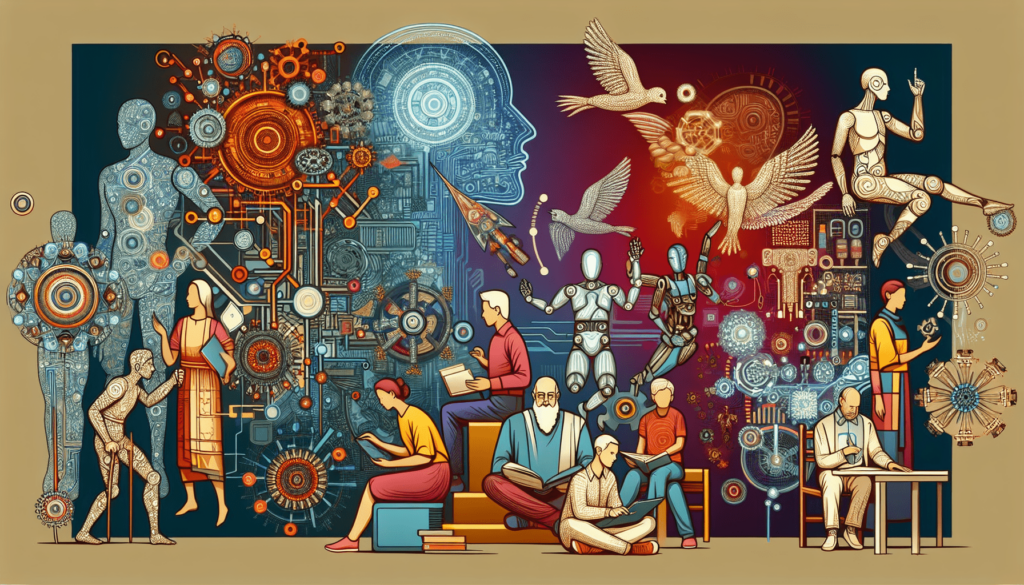Artificial Intelligence (AI) has rapidly evolved, revolutionizing various industries and sectors. Its innovation and efficiency have opened up new horizons of possibilities, leading to economic growth and job creation. The personalized experience it offers has greatly enhanced our lives. However, there are concerns that accompany this remarkable development. Job displacement worries, ethical and privacy issues, and the lack of emotional intelligence in AI systems pose significant challenges. Additionally, the fear of AI becoming uncontrollable has prompted the need for ethical AI development. Adopting a continuous learning and collaborative approach is crucial in addressing these ethical concerns and privacy issues, ensuring a responsible and beneficial AI future for all.

Job Displacement Concerns
With the rapid advancement of automation and artificial intelligence (AI), there is a growing concern over the potential loss of jobs. Many fear that as AI systems continue to become more capable, they will replace human workers in various industries. This displacement of jobs can have significant repercussions for individuals and society as a whole.
The skills gap and the challenge of retraining workers are two key issues associated with job displacement. As automation takes over repetitive and manual tasks, the demand for skills in those areas decreases. This can lead to a mismatch between the skills workers possess and the skills that are in demand. Retraining programs and initiatives become crucial in order to help displaced workers acquire new skills that are relevant in the AI-driven economy.
Furthermore, the impact of job displacement goes beyond just individuals. It also has implications for income inequality. If certain job sectors are heavily affected, individuals who were once employed in those sectors may face difficulty in finding new employment opportunities. This can lead to a widening gap between the rich and the poor, further exacerbating income disparities in society.
Fear of Uncontrollable AI
The idea of AI systems becoming completely autonomous and making unpredictable decisions is a concern for many. While AI technology has undoubtedly advanced in recent years, there is still a lack of control and understanding when it comes to the decisions made by AI systems. This lack of control raises ethical concerns and the fear that AI systems may make decisions that go against human values or pose risks to society.
Transparency is another area of concern when it comes to AI decision-making processes. It is often challenging to discern how AI systems arrive at certain conclusions or recommendations. This lack of transparency can make it difficult to trust the decisions made by AI, especially in critical areas such as healthcare, finance, or criminal justice.
Moreover, there is a risk of AI systems being used for malicious purposes. As AI technology becomes more powerful, there is the potential for it to be misused by individuals or organizations with malicious intent. Whether it is hacking into systems, spreading misinformation, or conducting cyber-attacks, the misuse of AI systems can have severe consequences for individuals, businesses, and even national security.
Ethical AI Development
In order to address the concerns surrounding AI development, it is essential to ensure fairness and avoid bias in AI algorithms. AI systems are only as good as the data they are trained on, and if that data is biased, the results generated by those systems may also be biased. This bias can lead to unfair outcomes, such as algorithmic discrimination in hiring or lending decisions. Therefore, it is crucial to develop AI algorithms that are fair and unbiased, and to continuously evaluate and monitor their performance to identify and rectify any biases.
Addressing privacy concerns and data protection is also a critical aspect of ethical AI development. AI systems often rely on vast amounts of personal data to make accurate predictions or recommendations. However, the collection and use of personal data raise concerns regarding privacy rights and the potential for misuse or unauthorized access. Implementing robust data protection measures and ensuring individuals have control over their personal data is crucial in upholding ethical standards in AI development.
Promoting accountability and transparency in AI systems is another essential component of ethical development. AI algorithms should be designed in a way that allows for traceability, explaining how they arrived at certain decisions or recommendations. This transparency fosters trust and understanding, making it easier for individuals and organizations to assess the ethical implications of AI systems and hold them accountable for their actions.

Continuous Learning
AI systems need to be able to adapt and improve over time to remain effective and relevant. This requires continuous learning and the ability to adjust their algorithms based on new data and feedback. However, there are challenges associated with balancing efficiency and ethical considerations in continuous learning.
Efficiency is often a key goal in AI development, as systems are designed to perform tasks faster and more accurately than humans. However, ethical considerations, such as fairness and bias prevention, should not be compromised in the pursuit of efficiency. Striking the right balance between efficiency and ethical considerations is crucial to ensure that AI systems are both effective and responsible.
Additionally, the importance of ongoing monitoring and updating of AI models cannot be overstated. As new data becomes available or societal norms evolve, it is necessary to re-evaluate and update AI algorithms to ensure they align with the current ethical standards. This ongoing process of monitoring and updating is vital to address emerging ethical concerns and maintain the integrity of AI systems.
Collaborative Approach
Developing ethical AI requires a collaborative approach involving multiple stakeholders. Government, industry, academia, and the public all have a role to play in shaping the future of AI development. Multidisciplinary collaboration can help to bring diverse perspectives and expertise to the table, ensuring that ethical considerations are adequately addressed.
Ethical considerations should be integral to AI research and development from the outset. By incorporating ethical principles into the design and development process, potential ethical concerns can be identified and mitigated early on. This proactive approach can help prevent unintended negative consequences and foster the responsible development of AI technology.
Collaboration between government, industry, and academia is also essential in establishing guidelines and regulations to govern AI development and deployment. By working together, these stakeholders can create frameworks that balance innovation and growth with ethical considerations, ensuring that AI technology is developed and utilized in a manner that benefits society as a whole.
Ethical and Privacy Issues
One of the primary concerns surrounding AI development is the use of personal data for AI training. AI systems often rely on large datasets to learn from and make predictions or recommendations. However, the use of personal data raises ethical questions regarding consent, privacy, and potential misuse. It is crucial to establish robust privacy protocols and ensure that individuals have control over how their data is used and shared.
Protecting confidentiality and privacy rights is essential when it comes to AI development. As AI technology becomes more prevalent in various industries, it is essential to establish clear guidelines to protect individuals’ privacy rights. This includes implementing measures to safeguard data from unauthorized access or breaches and ensuring that individuals’ personal information is handled with the utmost care and security.
Mitigating the risks of discrimination and unethical use of AI is another key ethical consideration. AI systems that are biased or discriminatory can perpetuate and amplify existing social biases, leading to unfair outcomes for individuals or marginalized groups. It is crucial to develop algorithms that are unbiased and free from discriminatory tendencies, as well as to continuously evaluate and monitor their performance to identify and rectify any biases.
Innovation and Efficiency
AI technology has the potential to revolutionize efficiency in various industries. From automating repetitive tasks to improving decision-making processes, advancements in AI can lead to increased productivity and cost savings for businesses. The ability to analyze vast amounts of data and identify patterns or trends that humans might miss can significantly enhance efficiency and drive innovation.
Moreover, AI integration can lead to innovation in industries that were previously constrained by human limitations. AI systems can process and analyze large datasets, enabling the identification of insights and solutions to complex problems. This opens up new avenues for scientific research and discovery, as AI technology can support and augment human capabilities in ways that were not previously possible.
While the focus on efficiency and innovation is essential, it is equally important to ensure that ethical considerations are not overlooked. Striking the right balance between efficiency and ethical standards is crucial in order to harness the full potential of AI technology for the greater good.
New Horizons of Possibilities
One of the most exciting aspects of AI development is the exploration of new applications and capabilities. AI systems have the potential to solve complex problems and challenges that were once considered insurmountable. From healthcare and transportation to climate change and space exploration, AI technology can contribute to finding innovative solutions and pushing the boundaries of human knowledge and capabilities.
By leveraging the power of AI, scientists and researchers can analyze vast amounts of data, identify patterns, and make predictions that can lead to groundbreaking discoveries. The ability to process and analyze data at a scale and speed that surpasses human capabilities allows for new insights and possibilities in scientific research.
Furthermore, AI can aid in addressing societal challenges, such as improving healthcare outcomes or managing scarce resources more efficiently. With the potential for personalized medicine, precision agriculture, and smart cities, AI opens up a world of new possibilities that can have a significant impact on the well-being of individuals and communities.
Economic Growth and Job Creation
Despite concerns about job displacement, AI development also has the potential to drive economic growth and job creation. Advancements in AI technology can lead to increased productivity, improved efficiency, and cost savings for businesses. This, in turn, can spur economic growth and innovation, creating new opportunities in AI-related fields.
As AI technology continues to evolve, new job opportunities will emerge, requiring a workforce skilled in areas such as machine learning, data science, and AI engineering. By investing in education and training programs that focus on developing these skills, individuals can position themselves for employment in the AI-driven economy.
Furthermore, the potential for economic transformation is not limited to developed countries. Developing countries can also benefit from the adoption of AI technology, as it can help leapfrog certain developmental stages and accelerate economic progress. By embracing AI and capitalizing on its potential, developing countries can foster economic growth and create new avenues for job creation.
Enhanced Personalization
AI technology has the ability to improve user experiences and provide personalized recommendations in various domains. From online shopping and entertainment platforms to personalized healthcare and education, AI can tailor products and services to individual preferences and needs.
By analyzing user data, AI systems can understand customer preferences, behaviors, and expectations, allowing for personalized recommendations that enhance the user experience. This can lead to increased customer satisfaction and loyalty, as individuals feel that their needs are understood and catered to.
Personalization also has the potential to revolutionize healthcare. By leveraging AI technology, personalized medicine can be developed, allowing for more accurate diagnoses, targeted treatments, and improved patient outcomes. This tailored approach to healthcare has the potential to significantly improve the quality of care and individuals’ overall well-being.
In conclusion, while AI technology brings forth a multitude of benefits and opportunities, it also raises significant ethical concerns. Job displacement, fear of uncontrollable AI, and ethical and privacy issues are just some of the challenges that need to be addressed in the development and deployment of AI systems. By adopting a collaborative approach, ensuring ethical guidelines, promoting fairness and transparency, and continuously monitoring and updating AI models, we can strive to harness the full potential of AI while upholding ethical standards and protecting individuals’ rights. With careful consideration and responsible development, AI can pave the way for a future that is not only innovative and efficient but also inclusive and beneficial for all.

